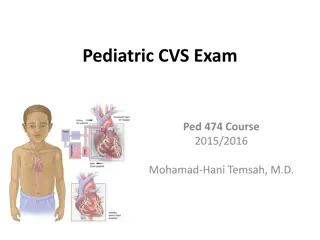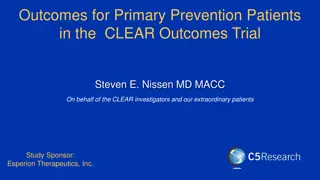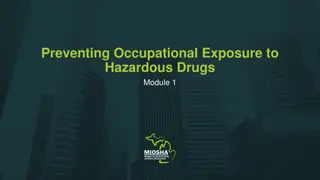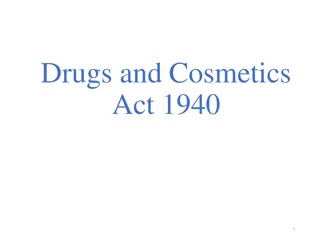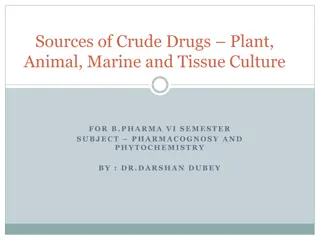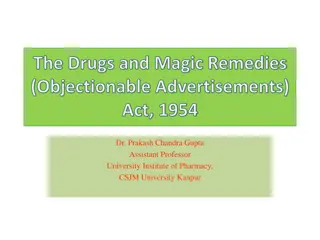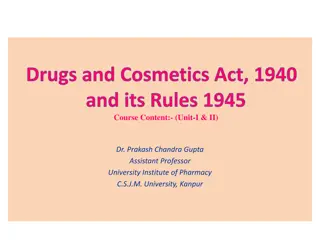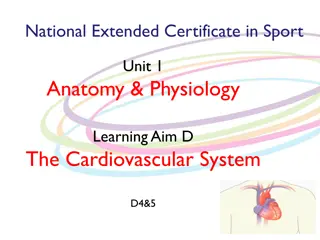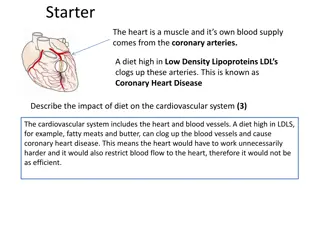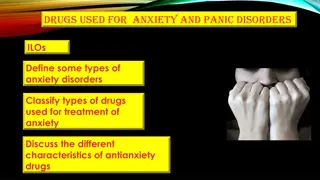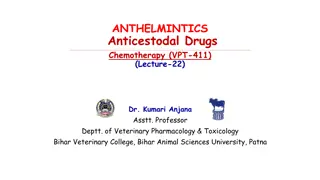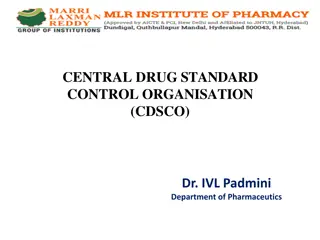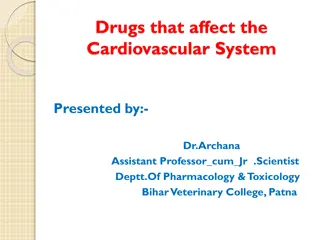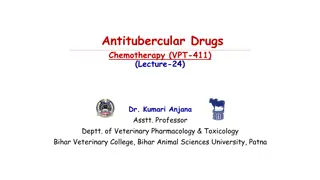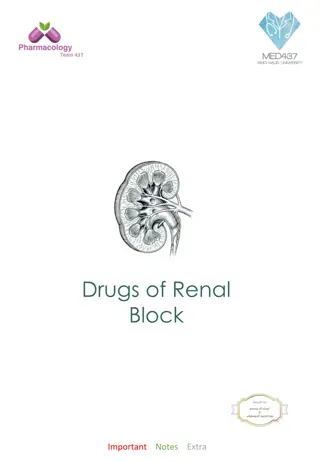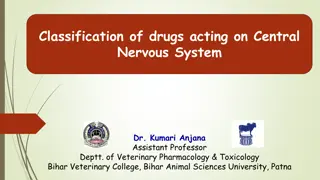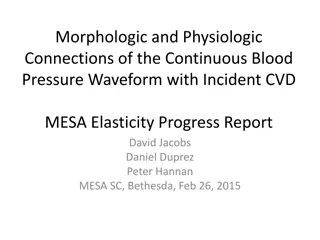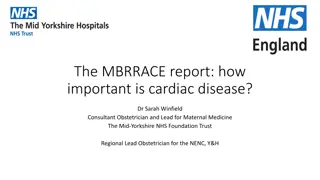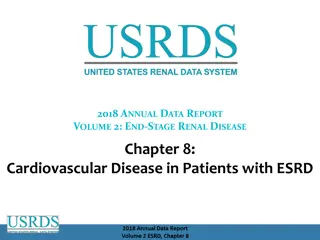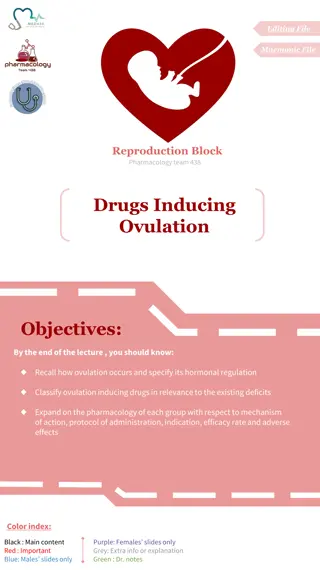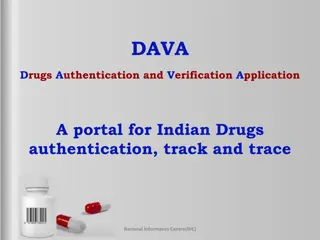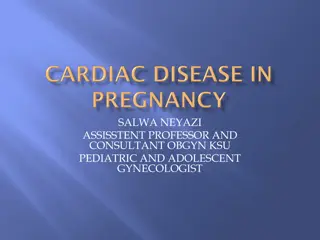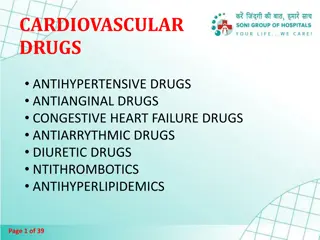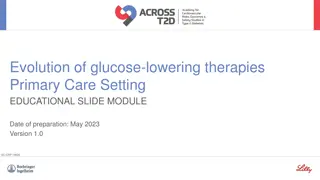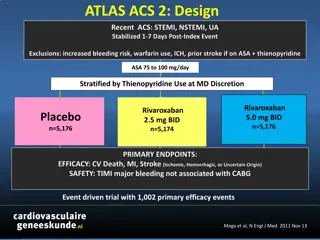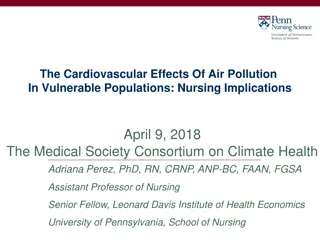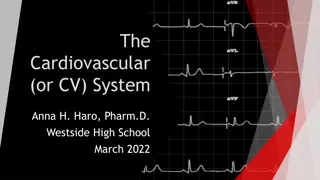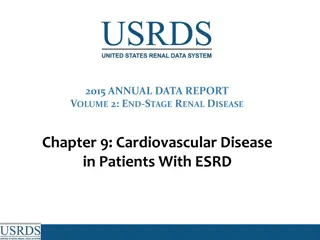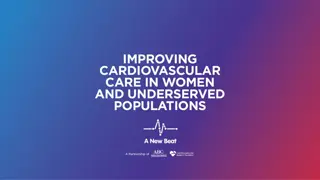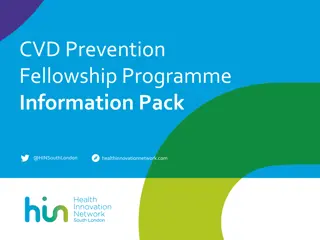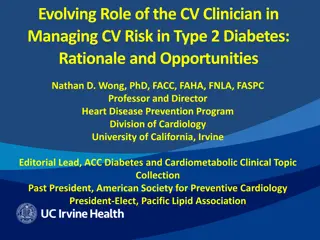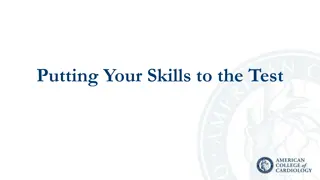Inflammation and Cholesterol Predicting Cardiovascular Events
This study explores how inflammation and cholesterol levels predict cardiovascular events among 13,970 statin-intolerant patients in the CLEAR Outcomes trial. Findings suggest residual inflammatory risk may be a stronger predictor than residual cholesterol risk for future events. The research analyz
0 views • 17 slides
Insights from the REPRIEVE Trial for Managing Cardiovascular Risk in Patients with HIV
Cardiovascular disease is a growing concern in individuals living with HIV, despite advancements in treatment. The REPRIEVE Trial sheds light on the importance of assessing cardiovascular risk and implementing primary prevention measures in this population. Dr. Grinspoon's financial disclosures and
0 views • 35 slides
The REPRIEVE Trial: Developing Cardiovascular Disease Prevention Strategy for People Living with HIV
The REPRIEVE trial focuses on developing a cardiovascular disease prevention strategy for individuals living with HIV. It addresses the increased risk of CVD in this population, even with good viral suppression. The study evaluates the use of pitavastatin, a statin with anti-inflammatory properties,
1 views • 33 slides
Pediatric Cardiovascular Exam Overview
Explore the differences between pediatric and adult cardiovascular exams, highlighting key differences in disease patterns, examination approaches, and objectives. Learn about the importance of distinguishing between routine well-baby exams and evaluations of ill children, along with step-by-step gu
6 views • 24 slides
CLEAR Outcomes Trial: Bempedoic Acid for Cardiovascular Prevention
The CLEAR Outcomes Trial investigated the effects of bempedoic acid, an ATP citrate lyase inhibitor, on cardiovascular outcomes in primary prevention patients. Results showed a reduction in cardiovascular events with bempedoic acid, particularly in patients intolerant to statins. Baseline characteri
1 views • 13 slides
Occupational Exposure to Hazardous Drugs: Risks and Prevention
Learn about the hazards of exposure to hazardous drugs, including potential health risks such as cancer, nausea, reproductive toxicity, and organ damage. Explore training modules, drug categories, and a list of hazardous drugs to ensure workplace safety. Discover NIOSH criteria for identifying hazar
1 views • 42 slides
Overview of Drugs and Cosmetics Act, 1940
The Drugs and Cosmetics Act of 1940 was enacted to regulate the import, manufacture, distribution, and sale of drugs and cosmetics in India. The Act aims to ensure high standards of medical treatment, prevent substandard drugs, and establish advisory boards for different types of drugs. It sets out
0 views • 49 slides
Sources of Crude Drugs: Plant, Animal, Marine, and Tissue Culture in Pharmacognosy
Crude drugs are natural substances obtained from plants, animals, and minerals. They are used without much processing and have therapeutic properties. Different plant parts like leaves, flowers, fruits, seeds, roots, bark, and stems yield various important drugs. Animals and minerals also serve as s
2 views • 19 slides
The Drugs and Magic Remedies (Objectionable Advertisements) Act, 1954 Overview
The Drugs and Magic Remedies (Objectionable Advertisements) Act of 1954 regulates the advertising of drugs and remedies claiming magical properties in India. It defines drugs and magic remedies, prohibits certain types of advertisements related to drugs, and aims to control misleading marketing prac
0 views • 12 slides
Overview of Drugs and Cosmetics Act, 1940 and Its Rules 1945
The Drugs and Cosmetics Act of 1940 and its Rules of 1945 were established to regulate the import, manufacture, distribution, and sale of drugs and cosmetics in India. The Act ensures that only qualified individuals are involved in these processes and aims to prevent the entry of substandard or spur
2 views • 116 slides
Effects of Exercise on the Cardiovascular System
Exploring the immediate and long-term effects of exercise on the cardiovascular system reveals the remarkable adaptations and responses the body undergoes. From short-term increases in heart rate and blood pressure to long-lasting changes in cardiac output, exercise plays a crucial role in enhancing
0 views • 13 slides
Impact of Diet on Cardiovascular Health
The impact of diet on the cardiovascular system is significant, with a high intake of LDL leading to clogged arteries and increased risk of Coronary Heart Disease. Regular exercise brings about positive changes in the cardiovascular system, enhancing heart function and oxygen delivery. Immediate ben
0 views • 7 slides
Overview of Anxiety Disorders and Antianxiety Drugs
Anxiety disorders are conditions characterized by excessive worry and fear that can interfere with daily life. Common types include generalized anxiety disorder, panic disorder, phobias, and OCD. Treatment options include psychotherapy and anxiolytic drugs such as benzodiazepines, 5HT1A agonists, be
0 views • 25 slides
Overview of Anticestodal Drugs in Veterinary Pharmacology
Anticestodal drugs play a crucial role in combating tapeworm infections in veterinary medicine. These drugs are classified into taeniafuges and taenicides, with examples of natural and synthetic compounds highlighted. Natural compounds like pumpkin seeds and male fern are traditionally used for thei
0 views • 29 slides
Overview of Central Drug Standard Control Organisation (CDSCO) in India
The Central Drug Standard Control Organisation (CDSCO) is the main regulatory body in India for pharmaceuticals, medical devices, and clinical trials. It functions under the Directorate General of Health Services, Ministry of Health and Family Welfare, Government of India. The CDSCO is responsible f
0 views • 18 slides
Understanding Generic Drugs and Brand Name Medications
Generic drugs are identical copies of brand-name medications in dosage, strength, quality, and intended use. They contain the same active ingredients but are sold under their chemical name. This article explores the basic differences between generic and brand-name drugs, when generic drugs are marke
0 views • 20 slides
Drugs Affecting the Cardiovascular System: Overview and Mechanisms
Explore the impact of various drugs on the cardiovascular system, including cardiac glycosides, vasodilators, anticoagulants, and more. Learn about the chemical nature and properties of glycosides and how they affect the heart's functioning.
1 views • 21 slides
Overview of Antitubercular Drugs: Introduction, Classification, and Applications
Tuberculosis is a chronic granulomatous disease caused by Mycobacterium bovis in ruminants and Mycobacterium avium in dogs and pigs. These bacteria have a unique waxy appearance due to their cell wall composition, providing a shield against pharmacological compounds. Antitubercular drugs play a cruc
3 views • 28 slides
Understanding Renal Block: Drugs, Excretion, and Treatment Essentials
Renal block plays a crucial role in drug excretion, with processes like glomerular filtration and tubular secretion affecting drug elimination. Factors like blood flow, physiochemical properties, and urine pH influence renal excretion of drugs. Competition between drugs for transporters can have ben
0 views • 10 slides
Advances in Antimicrobial Drugs: Selective Toxicity and Classification
The development of antimicrobial drugs has significantly improved therapeutics by controlling infections and preventing complications. These drugs target invading microorganisms using selective toxicity, sparing host cells. Antimicrobial drugs are classified based on site, mechanism of action, and c
0 views • 30 slides
Classification of Drugs Acting on Central Nervous System
The Central Nervous System (CNS) plays a crucial role in coordinating the body's functions and responses to the environment. Drugs acting on the CNS can be classified into CNS stimulants and CNS depressants. CNS stimulants include spinal, medullary, and cortical stimulants, with various direct and i
0 views • 10 slides
Morphologic and Physiologic Connections in Blood Pressure Waveforms for Cardiovascular Event Prediction
This report discusses the morphologic and physiologic connections in continuous blood pressure waveforms and their association with incident cardiovascular events. The study aims to assess if changes in arterial elasticity contribute to predicting CVD events and explores additional measures derived
0 views • 30 slides
The Importance of Addressing Cardiovascular Disease in Maternal Health
Cardiovascular disease remains a significant contributor to maternal mortality in the UK, with maternal deaths from cardiac issues outnumbering those from other direct causes, except thrombosis. The prevalence of cardiovascular risk factors in pregnant women, combined with a lack of consideration fo
0 views • 22 slides
Prevalence of Cardiovascular Disease in Adult ESRD Patients: 2016 Data Report
The data report examines the prevalence of cardiovascular diseases in adult End-Stage Renal Disease (ESRD) patients in 2016 by treatment modality and age. It includes information on various cardiovascular conditions such as atrial fibrillation, acute myocardial infarction, coronary artery disease, a
2 views • 25 slides
Pharmacology of Ovulation-Inducing Drugs
Understanding the mechanism of ovulation and hormonal regulation is key in classifying drugs used to induce ovulation. This lecture covers the pharmacology of different groups of drugs, their mechanisms of action, administration protocols, indications, efficacy rates, and adverse effects. Antiestrog
0 views • 6 slides
DAVA Drugs Authentication & Verification Application by National Informatics Centre
The DAVA Drugs Authentication & Verification Application, developed by the National Informatics Centre of the Government of India, enables authentication, tracking, and tracing of Indian drugs at different packaging levels. Manufacturers maintain Unique Serial Numbers for primary and secondary packa
2 views • 42 slides
Understanding Cardiovascular Changes in Pregnancy
This informative content discusses the normal physiological changes of the cardiovascular system in pregnancy, symptoms and signs of cardiovascular disease, the impact of pregnancy on cardiovascular health, and the management of cardiovascular issues during pregnancy, labor, and the postpartum perio
0 views • 28 slides
Understanding the Impact of Drugs on Pregnancy Development
This lecture covers factors influencing placental transfer, harmful effects of drugs at different developmental stages, FDA classifications of drugs, and teratogenic drugs. It explains how drugs cross the placenta, including physiochemical properties and stage of development affecting transfer. The
0 views • 10 slides
Understanding Cardiovascular Drugs: An Overview of Treatment Options
Explore the world of cardiovascular drugs, including antihypertensive, antianginal, heart failure, antiarrhythmic, diuretic, antithrombotic, and antihyperlipidemic medications. Dive into the mechanisms of action, clinical indications, and adverse effects of these drugs, gaining valuable insights int
0 views • 39 slides
Evolution of Glucose-Lowering Therapies in Primary Care Settings
Cardiovascular effects of older glucose-lowering therapies and the history of cardiovascular outcome trials are discussed in this educational slide module. It outlines the timeline of treatment options from the discovery of insulin to the introduction of various medications. Evidence regarding the c
0 views • 29 slides
Investigating the Impact of Weekly Incretin on Cardiovascular Events in Diabetes
Individuals with type 2 diabetes have an increased risk of cardiovascular events compared to those without the condition. Research indicates that certain GLP-1 receptor agonists have shown promising results in reducing cardiovascular events in diabetic patients with specific HbA1c levels. However, t
0 views • 69 slides
Clinical Trial Results of Rivaroxaban in ACS Patients: ATLAS-ACS 2 Study
The ATLAS-ACS 2 study investigated the efficacy and safety of rivaroxaban in ACS patients post-index event. The primary endpoints included cardiovascular death, MI, and stroke, with significant reductions seen with rivaroxaban compared to placebo. Stent thrombosis was also reduced with rivaroxaban t
0 views • 10 slides
GripTrack: Innovative Device for Monitoring Elderly Health
GripTrack is a portable grip strength monitoring device designed to track cardiovascular and musculoskeletal health in the elderly population. It aims to provide an accurate early warning system by assessing grip strength, which can indicate cognitive decline, cardiovascular health, and frailty synd
0 views • 14 slides
Understanding the Cardiovascular Effects of Air Pollution in Vulnerable Populations
This presentation discusses the significant cardiovascular effects of air pollution, particularly on vulnerable populations such as older adults, women, and Latinos. It highlights the environmental factors contributing to cardiovascular health disparities and emphasizes the nursing implications for
0 views • 13 slides
Understanding the Cardiovascular System: Anatomy, Physiology, and Function
Explore the intricate workings of the cardiovascular system, encompassing the heart, blood vessels, and blood circulation. Learn the anatomy, physiology, and function of this vital system, including the roles of arteries, veins, capillaries, and red and blue blood. Understand how the cardiovascular
0 views • 23 slides
Cardiovascular Disease in End-Stage Renal Disease Patients: Data Analysis 2011-2013
Understanding the prevalence and causes of cardiovascular diseases in patients with End-Stage Renal Disease (ESRD) is crucial for effective management. This report analyzes data from 2011-2013, focusing on the causes of death in ESRD patients, prevalence of cardiovascular diseases by treatment modal
0 views • 18 slides
Insights on Cardiometabolic Risk Reduction and Diabetes Treatment in 2019
Cardiologists in 2019 must address the significant cardiovascular risks associated with diabetes mellitus. Dr. Keith C. Ferdinand highlights the increased rates of heart disease, stroke, and heart failure in patients with diabetes. Despite advancements, cardiovascular risk management remains subopti
0 views • 10 slides
Cardiovascular Disease Prevention Fellowship Programme Information Pack
The Cardiovascular Disease Prevention Fellowship Programme by Health Innovation Network offers a comprehensive 7-month program for healthcare professionals to enhance their skills in cardiovascular disease prevention. The program includes clinical webinars, improvement collaborative sessions, and qu
0 views • 14 slides
The Evolving Role of Cardiovascular Clinicians in Managing Type 2 Diabetes Risk
The role of cardiovascular clinicians in managing cardiovascular risk in patients with type 2 diabetes is evolving, with a growing emphasis on collaboration with multidisciplinary teams. Recognizing the potential benefits of certain diabetes medications on cardiovascular outcomes, clinicians are urg
0 views • 25 slides
Understanding PCSK9 Inhibitors for Cardiovascular Health
PCSK9 inhibitors are a novel class of medications that help lower LDL cholesterol levels, reducing the risk of cardiovascular events. This article covers their mechanism of action, patient groups benefiting from them, efficacy in LDL-C lowering, and safety considerations. Learn how PCSK9 inhibitors
0 views • 8 slides



